David's Astronomy Pages (All Sky Camera)
Aurora on night 2025-03-25 / 2025-03-26
Aurora
2025-03-21
Aurora
Page
Home
Page
Aurora
2025-04-01
David's Astronomy Pages (All Sky Camera)
|
Aurora 2025-03-21 |
Aurora Page |
Home Page |
Aurora 2025-04-01 |
Aurora Notes
Night Summary (Keogram) Plot AllSky Pictures Videos Magnetometer Stack Plots (for reference) Planetary K-Index Plot (for reference) Aurora Forecast, NOAA/Ovation (for reference) 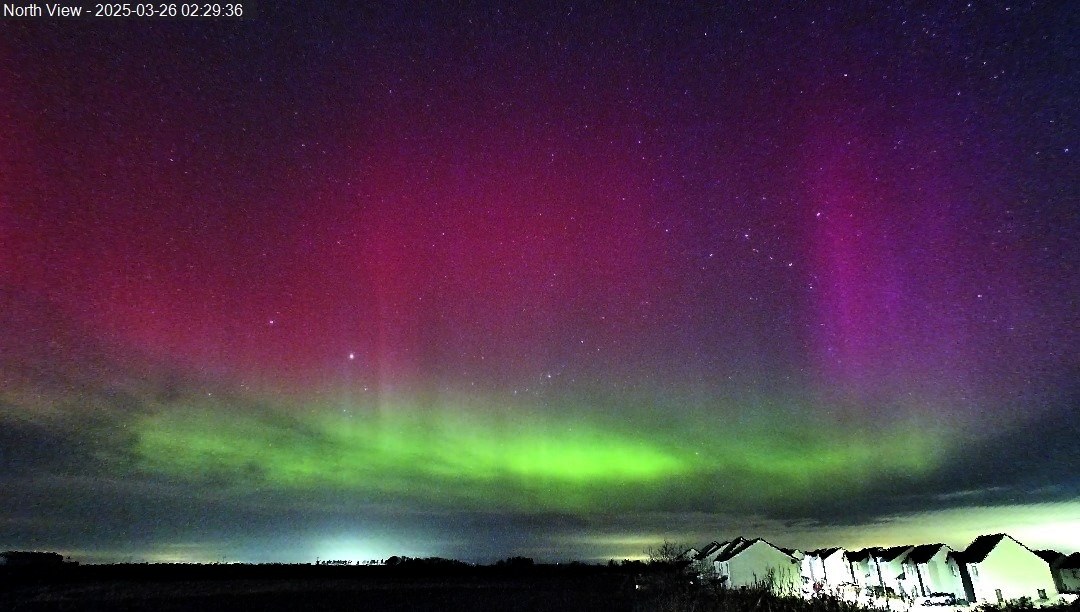
- Auroral activity on the night 2025-03-25 / 2025-03-26 associated with period of geomagnetic activity up to KP4.
Skies in NE Scotland were somewhat cloudy (especially in first half of night), but improved at around 01:20 UT
Activity was visible on camera images in early hours of 2025-03-26 from around 00:30 to 03:00 UT with peak activity visible at 00:35 to 00:50 UT and at 02:20 to 02:35 UT
Observed activity comprised green, violet, crimson & red aurora, with rays up to 50-60° altitude.
(Aurora may have been present before midnight but were hidden behind cloud)
The aurora display was recorded using the Observatory's new Tapo C325WB Colour Night Vision Camera, with images processed in real time by a new AstroColorCam program built for handing the frames captured by iSpy.
Images and video below compare colour images captured by the new Camera, with the black/white images captured using the existing AllSky Camera at approximately the same time.
- Scandinavian magnetometers recorded activity between 17:30 - 04:00 UT, with peaks in activity at 20:30, 00:45, 02:30-03:00 UT.
Lerwick Magnetometer shows activity up to K4.- SpaceWeather.Com wrote:
"Last night in Finland, Sebastian Sainio went outside to photograph some "pretty normal" green auroras. They didn't stay normal for long. "All of a sudden, the sky burst into flames, and this beautiful corona appeared behind our local radio tower," he says. ..
Karsten Berger in Muonio, Finland, also described the light show as an explosion. It was so bright, she says, "the intensity saturated the camera of my iPhone.
The outburst was probably caused by the arrival of a co-rotating interaction region (CIR) during the late hours of March 25th. CIRs are transition zones between fast- and slow-moving streams of solar wind; they contain shock waves akin to CMEs. This particular CIR was created and pushed toward Earth by solar wind flowing from a giant hole in the sun's atmosphere. Rainbow colors even reached Minnesota:in the USA
Geomagnetic storms are underway on March 26th as Earth enters a stream of fast-moving solar wind flowing from a giant hole in the sun's atmosphere. The intensity is fluctuating between category G1 (Minor) and G2 (Moderate). Earth should remain inside the stream for the next 24 hours, so storm conditions could continue into March 27th."
from SpaceWeather.Com 2025-03-26-
| Night Summary Plot - North Sky (2025-03-25) Times on plot are local times (GMT = UTC +00h ) Aurora Activity visible on colour keogram at 00:30 - 03:00 UT. with peaks as 00:45, 01:30, 02:00 and 02:30 UT |
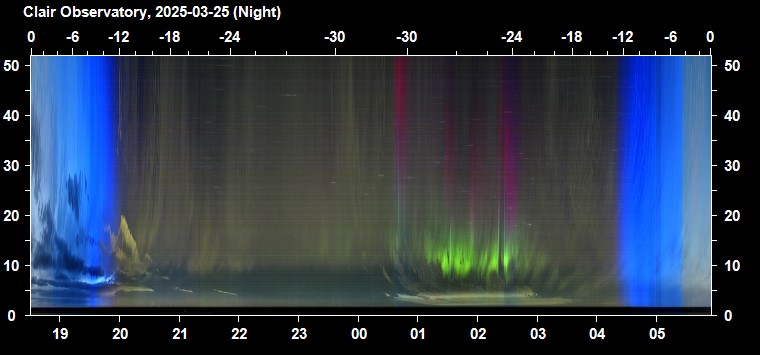 |
| Night Summary Plot - North Sky (2025-03-25) Times on plot are local times (GMT = UTC +00h ) Aurora visible on b/w keogram at 01:15-02::45 UT (aurora seen on the colour keogram at 00:45 is not readily recognised as aurora on the b/w keogram as the feature was interpreted as cloud. |
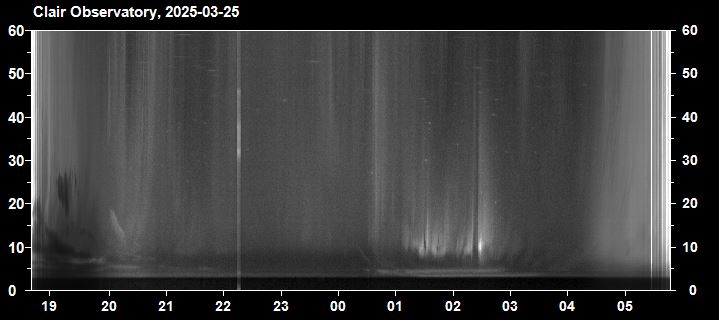 |
| Scandinavia Magnetometers vs NorthCam Keogram - 2025-03-25 / 2025-03-26 |
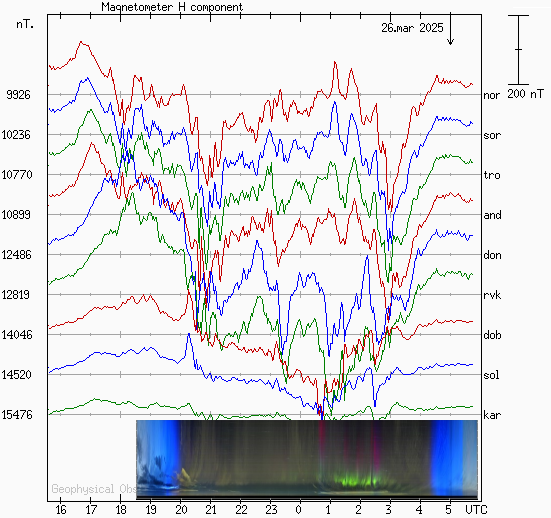 |
Back to Top
| Panoramic View - Northern Sky |
| 2025-03-26 00:31:52 UT (GMT) Appearance of green aurora, partly hidden by cloud |
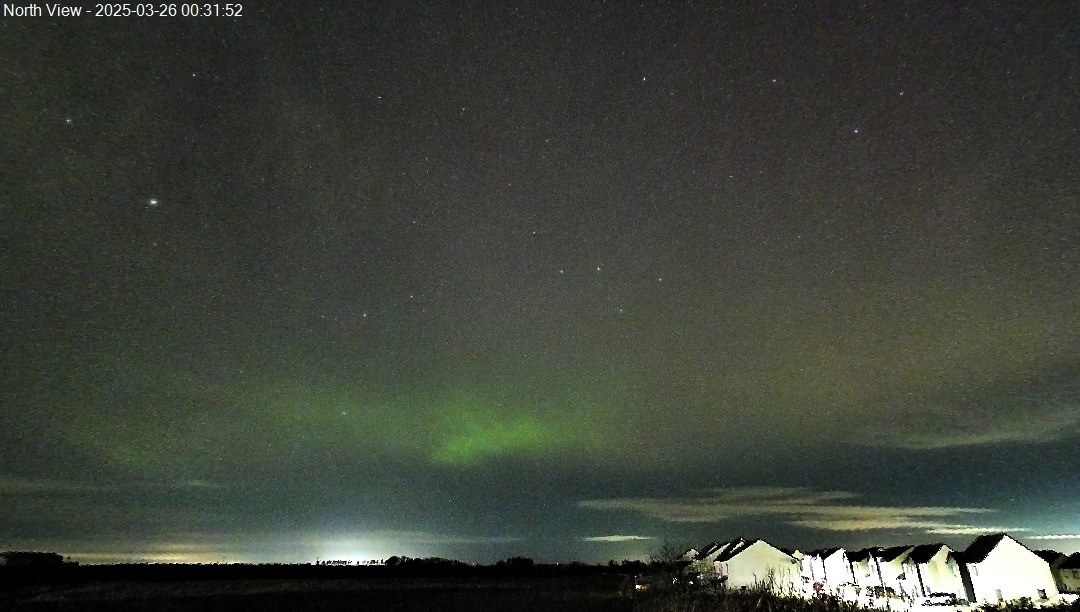 |
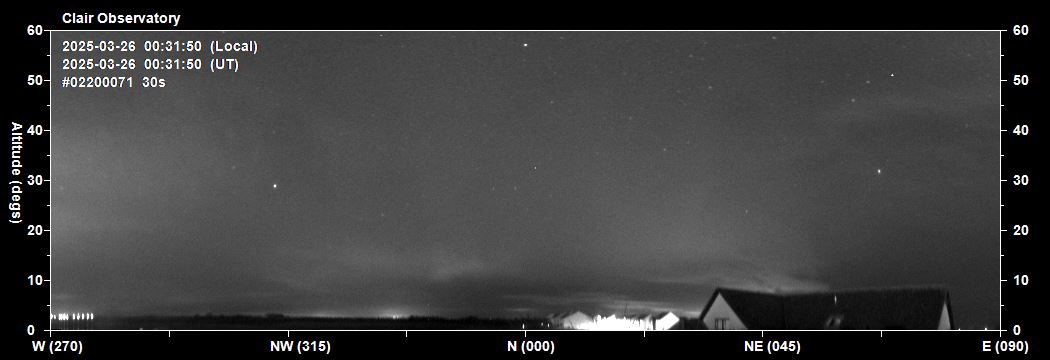 |
| 2025-03-26:00:35 UT (GMT) Green auroa with faint crimson rays to 50° altitude |
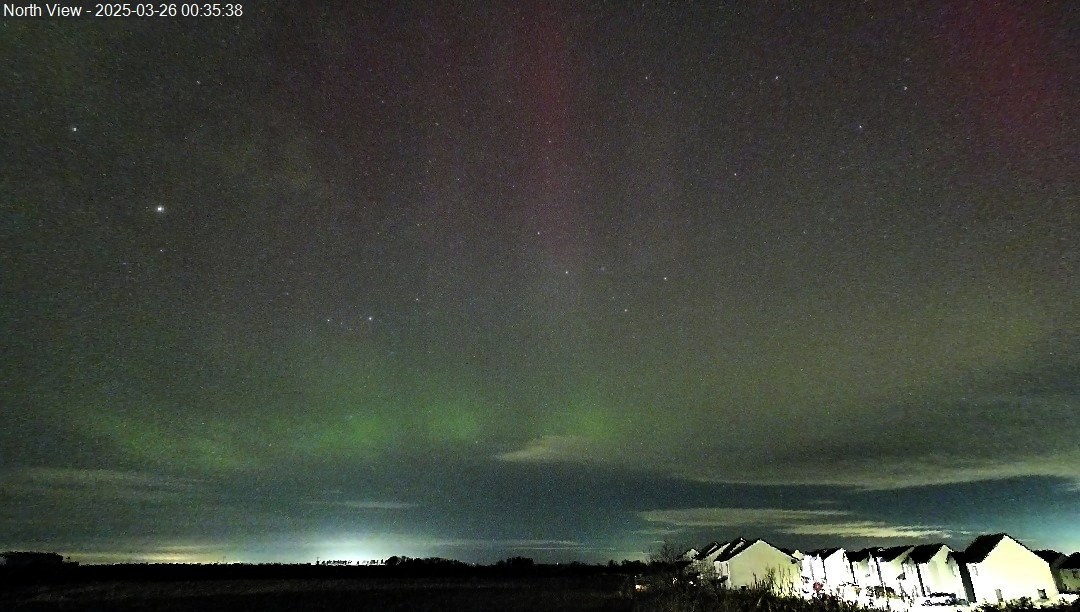 |
| 2025-03-26:00:38 UT (GMT) Increase in activity with rapid brightning of crimson & violet rays to 50-55° altitude |
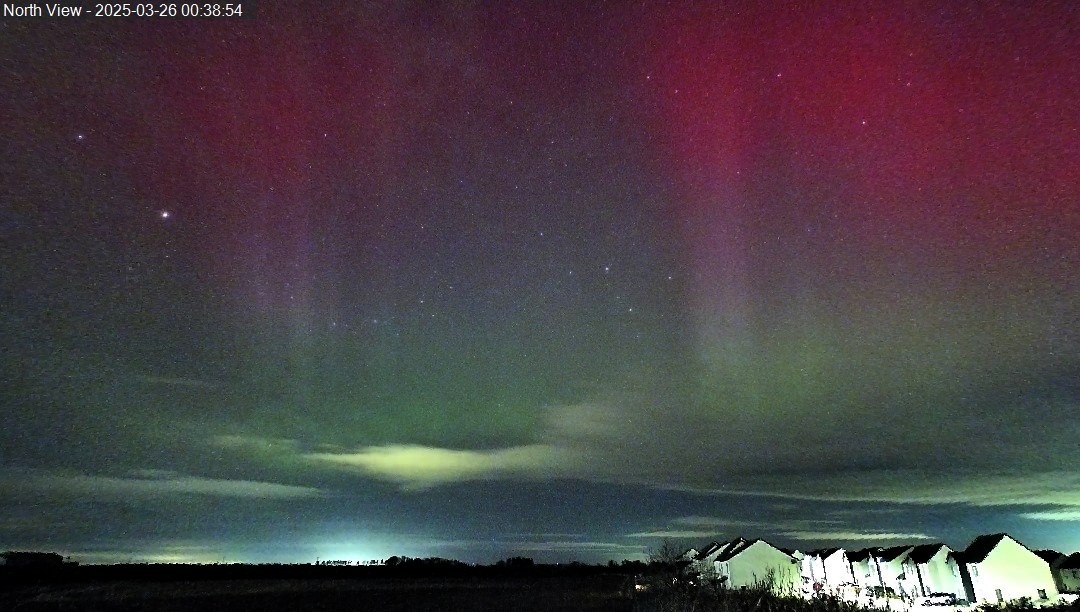 |
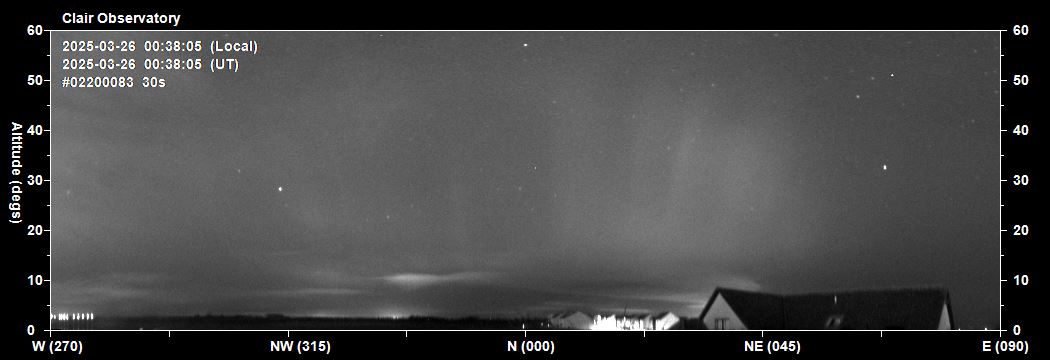 |
| 2025-03-26 00:39 UT (GMT) Bright crimson & red aurora rays, rapidly changing. |
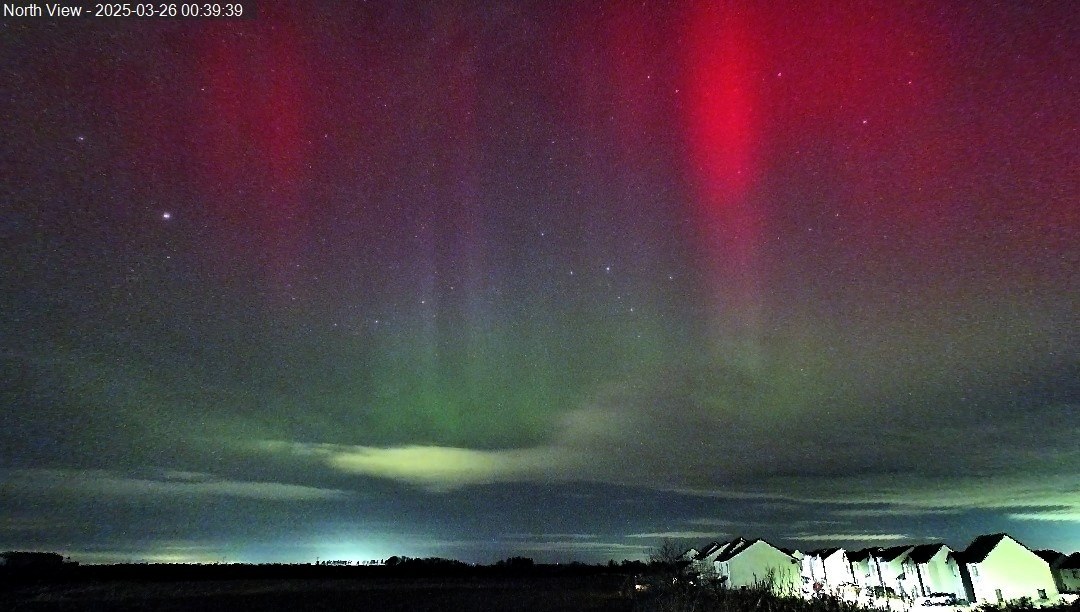 |
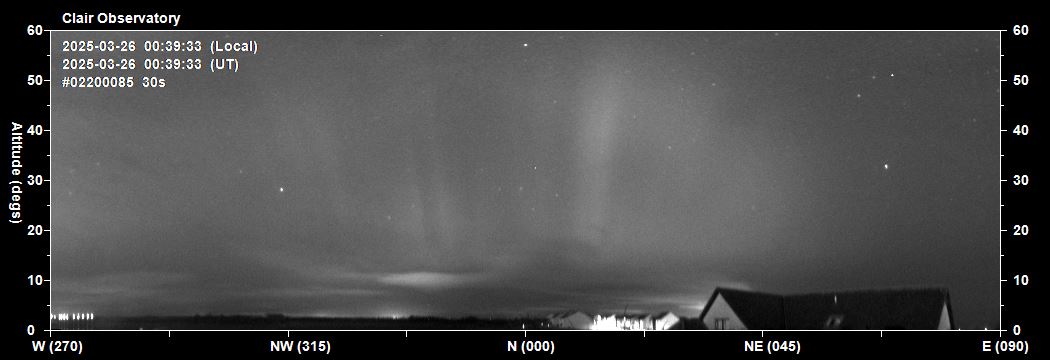 |
| 2025-03-26 00:43 UT (GMT) Continuing auroral activity |
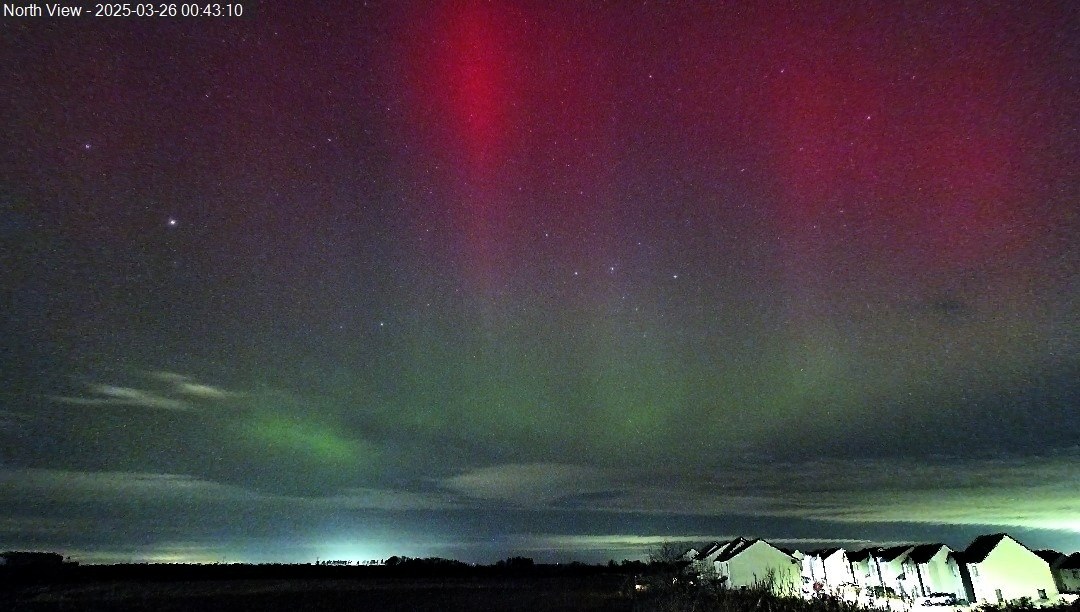 |
| 2025-03-26 00:48 UT (GMT) Continuing auroral activity. Bright red auroa reaching to 50-60° altitude. |
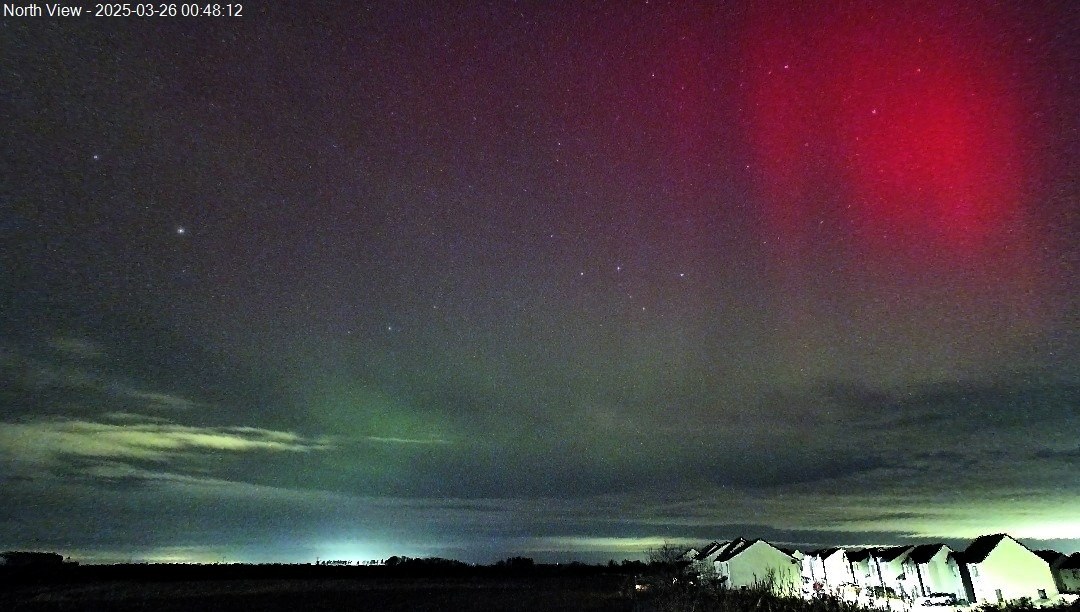 |
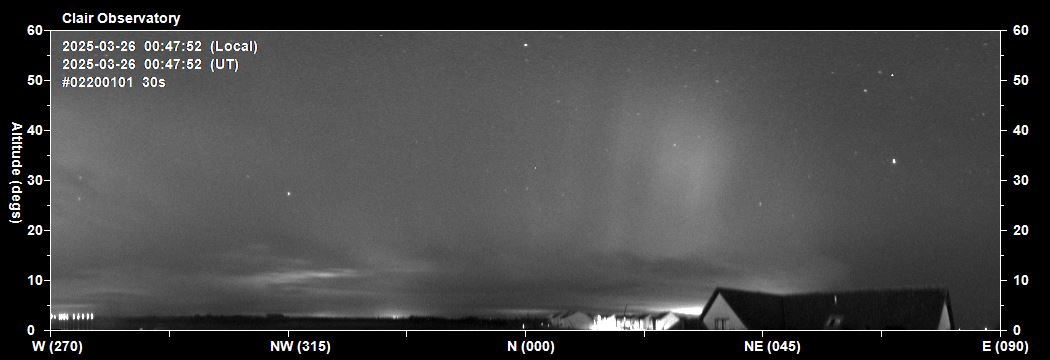 |
| 2025-03-26 01:13 UT (GMT) Green auroral appearing , but covered by foreground cloud.. |
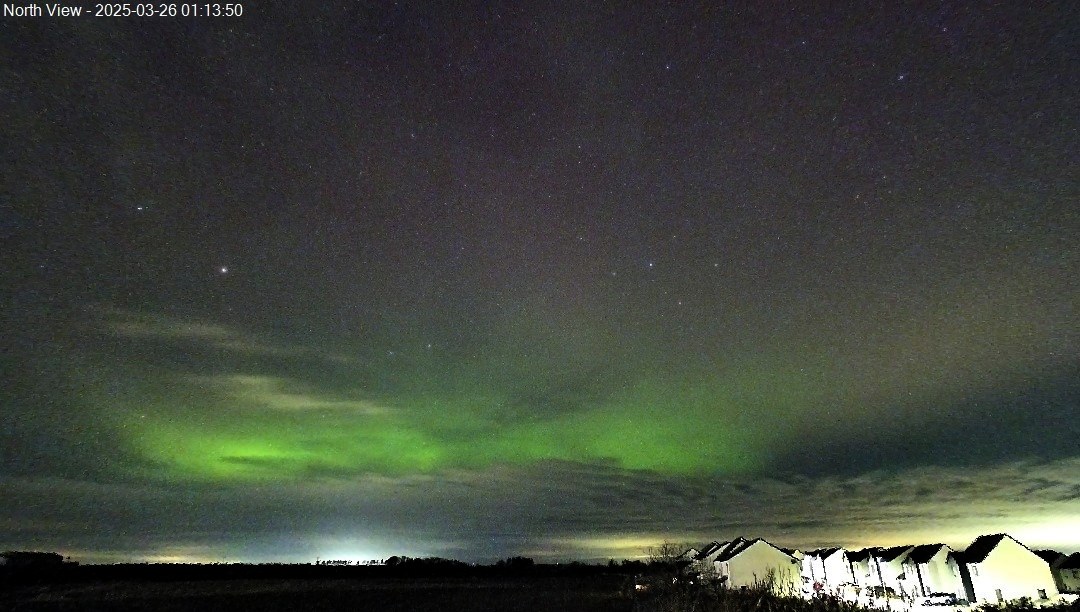 |
| 2025-03-26 01:28 UT (GMT) Green aurora brightening. Crimson coloured rays developing (up to 40-45° altitude) |
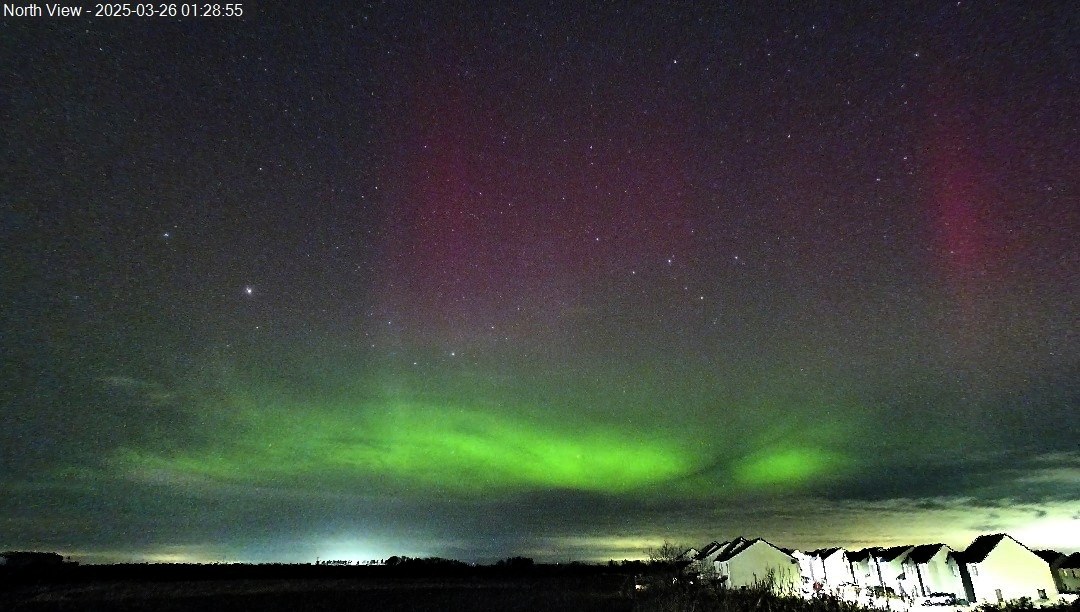 |
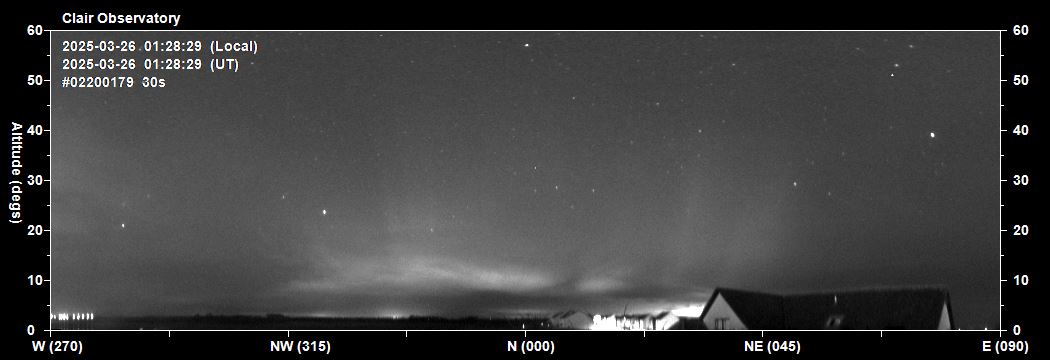 |
| 2025-03-26 01:54 UT (GMT) Aurora display fading, and is becoming obscured by mist or cloud |
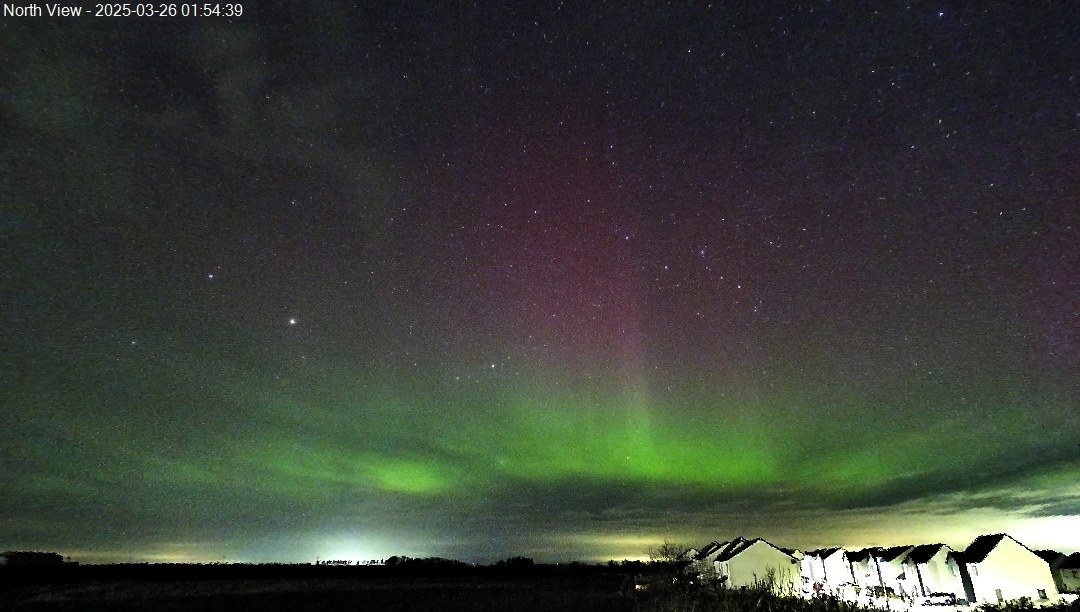 |
| 2025-03-26 02:21 UT (GMT) Auroral activity continuing |
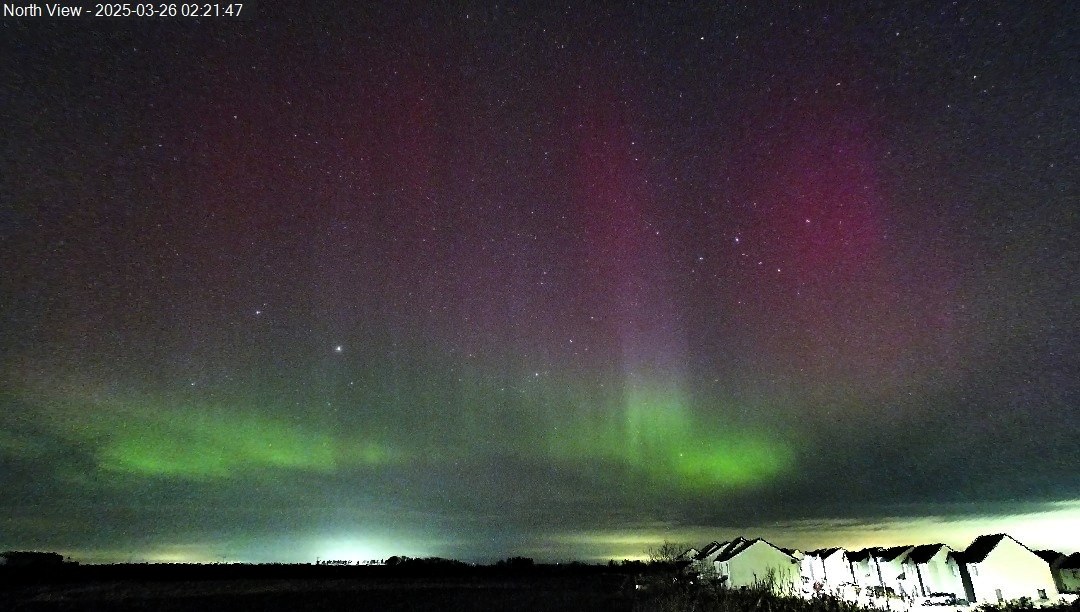 |
| 2025-03-26 02:27 UT (GMT) Bright green aurora band, with crimson & violet rays to 40° altitude |
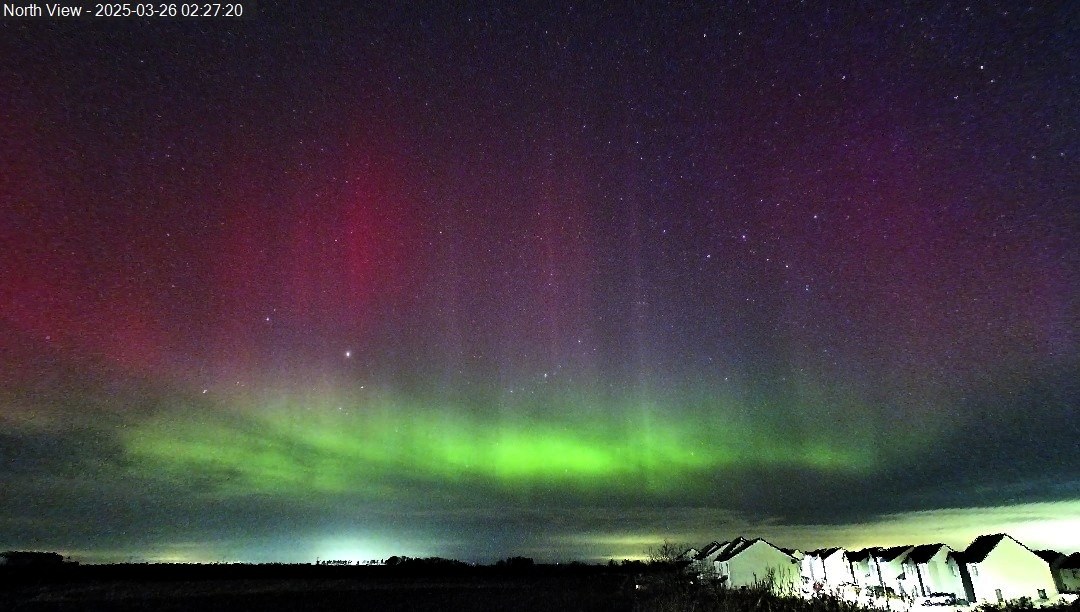 |
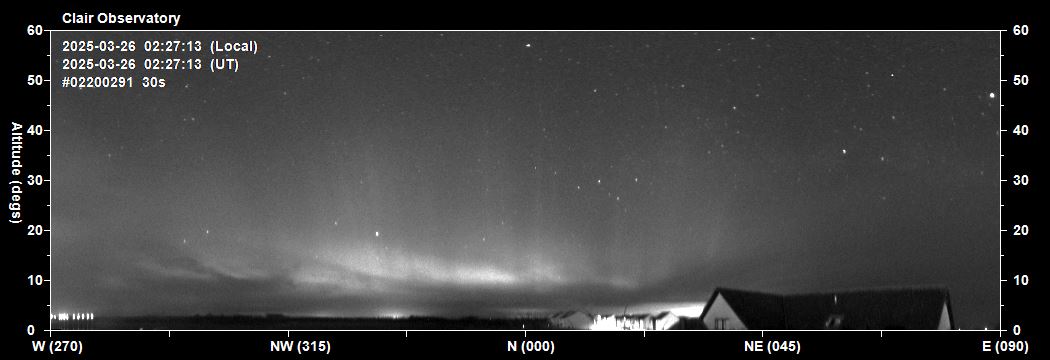 |
| 2025-03-26 02:28 UT (GMT) Continuing activity, with rapid changes in ray position & intensity |
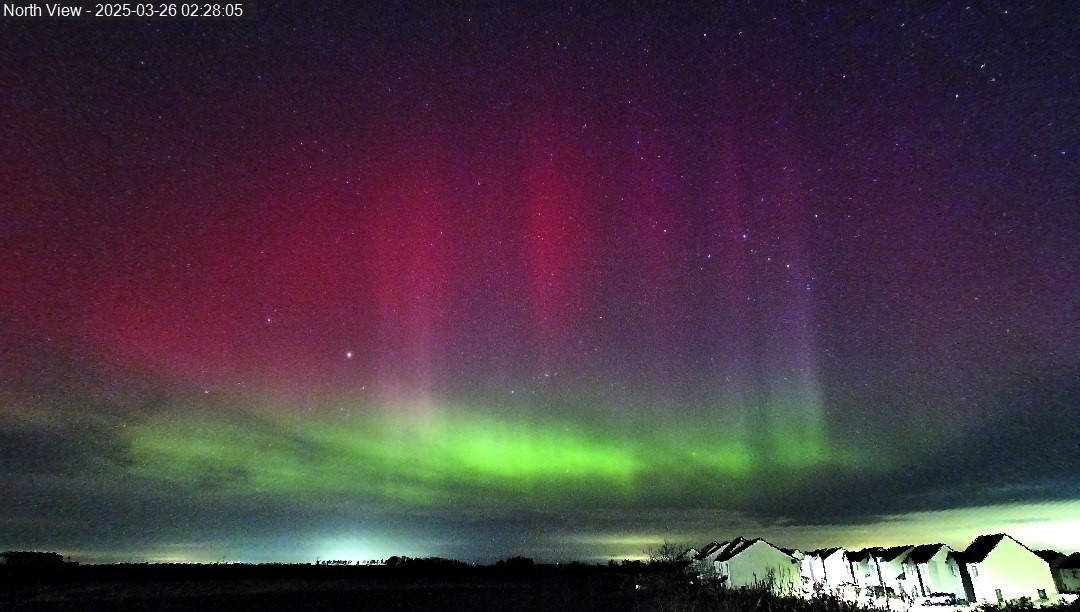 |
| 2025-03-26 02:29 UT (GMT) Noticeable difference between crimson aurora/rays in N - NW sky (left) and the violet aurora/rays in NNE-NE sky (right) |
 |
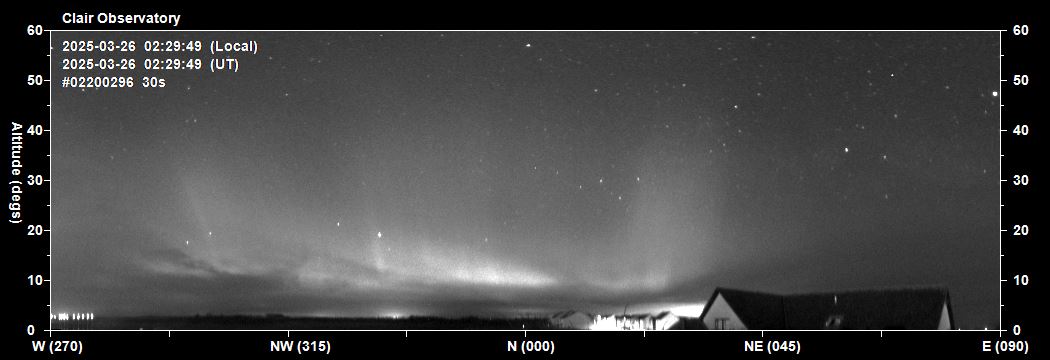 |
| 2025-03-26 02:37 UT (GMT) Activity decreasing, aurora fading. |
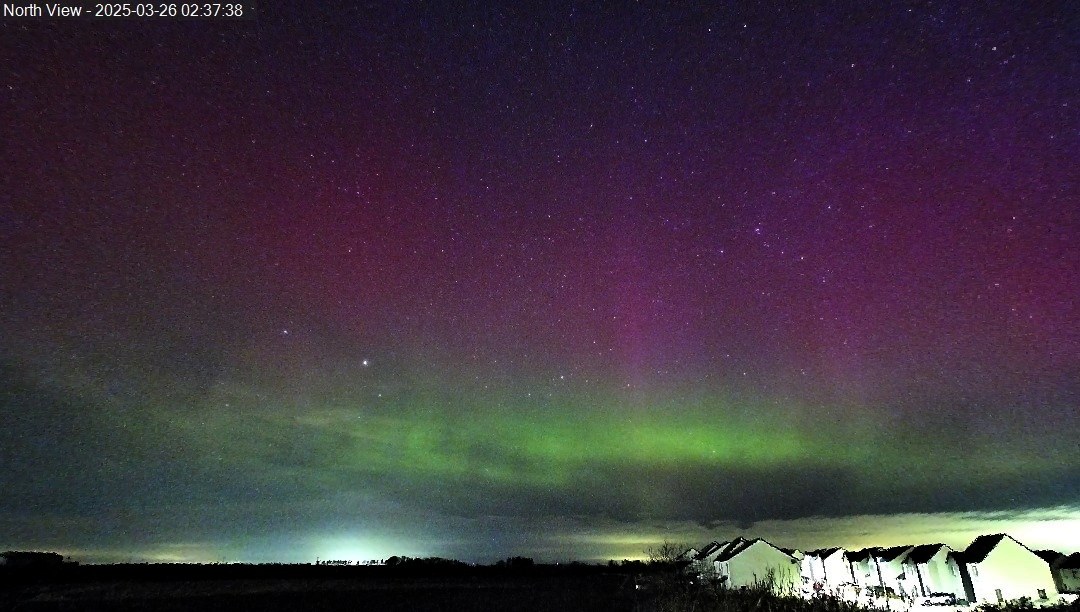 |
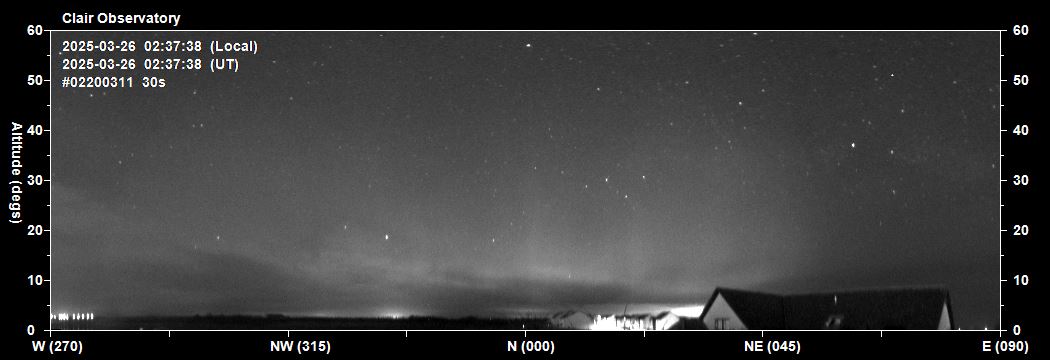 |
| 2025-03-26 02:50 UT (GMT) Activity declining further, leaving just a hint of green and violet aurora. |
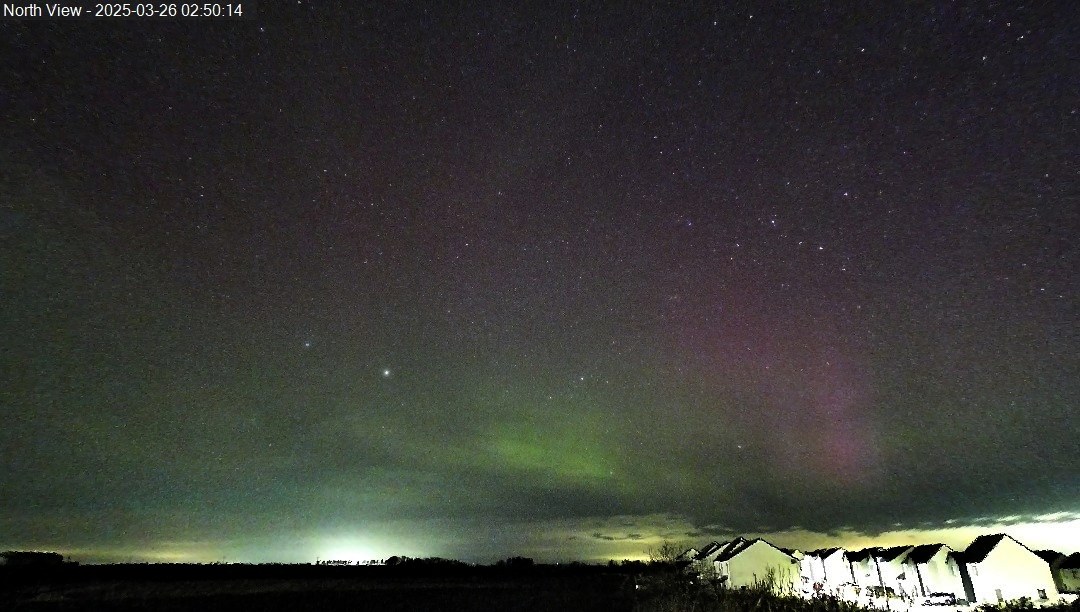 |
| 2025-03-26 03:00 UT (GMT) Activity declining further, leaving just a hint of green aurora which is also gradually getting hidden by cloud. |
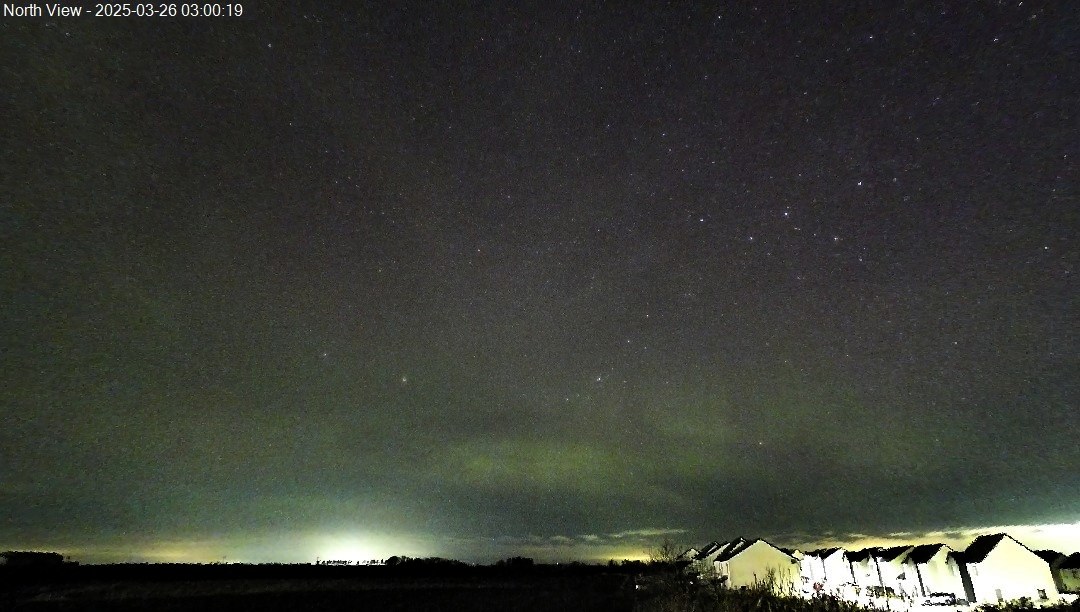 |
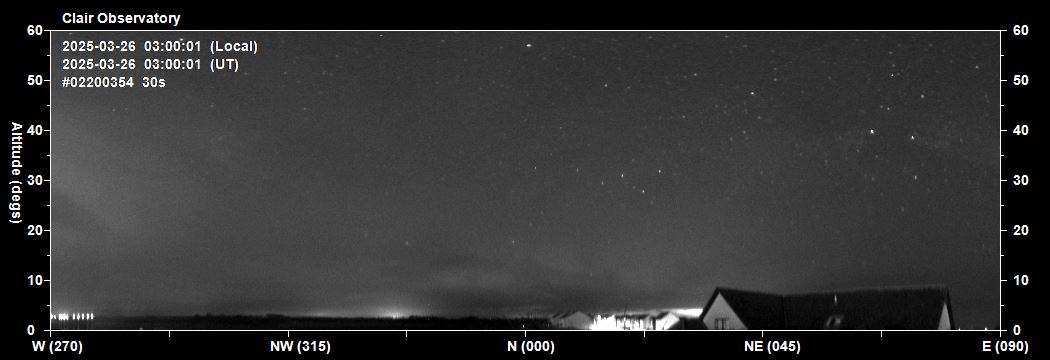 |
| 15s frames taken with Tapo C325WB Colour Camera
vs 30s wider-field exposures taken with Oculus All Sky Camera |
Back to Top
| Video: North panoramic view, 3.0 hr
period 2025-03-26 00:15 to 03:15 UT (GMT) |
| Link to .mp4 video file (4.6 MB) |
|
0.0s
/ 0.0s
|
| Video: North Cam view, 3.0 hr
period 2025-03-26 00:15 to 03:15 UT (GMT) |
| Link to .mp4 video file (4.1 MB) |
|
0.0s
/ 0.0s
|
Back to Top
| Magnetometer Stack Plots from Scandinavia
(ordered by latitude) H Component - 2025-03-25 / 2025-03-26 Activity between 17:30 - 04:00 UT, with peaks in activity at 20:30, 00:45, 02:30-03:00 UT Note: Geomagnetometer activity at rvk (Rorvik, 64.95N), dob (Dombas, 62.07N), sol (Solund, 61.08N) and kar (Karmoy, 59.21N) stations are used as indicators for potential auroral activity that may be visible from my Observatory situated at latitude 57.32N (Map of Stations) |
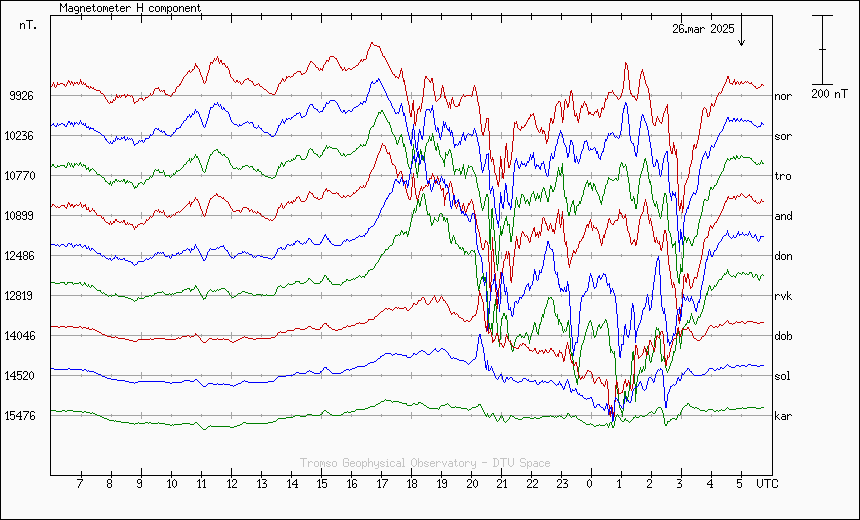 |
|
Graphed using 'make your own graph' facilities at
https://flux.phys.uit.no/compose/ (Tromsų Geophysical
Observatory ) Original data from Tromsų Geophysical Observatory (TGO), DTU Space (Technical University of Denmark) and Finnish Meteorological Institute (FMI) Data also displayed on SpaceWeatherLive's Europe Stackplot at http://www.spaceweatherlive.com/en/auroral-activity/magnetometers). |
Back to Top
|
Estimated 3 hour Planetary K-Index (NOAA) (from http://services.swpc.noaa.gov) Planetary-k-index_2025-03-25 / 2025-03-26 Not captured |
|
SAMNET's magnetometer at Sumburgh, Shetland
(Chart
Explanation) - Geomagnetic activity on the night 2025-03-25 / 2025-03-26 Plot shows moderate activity at 20:00-21:00 UT & 00:00 - 04:00 UT with peak at 02:00-03:00 UT |
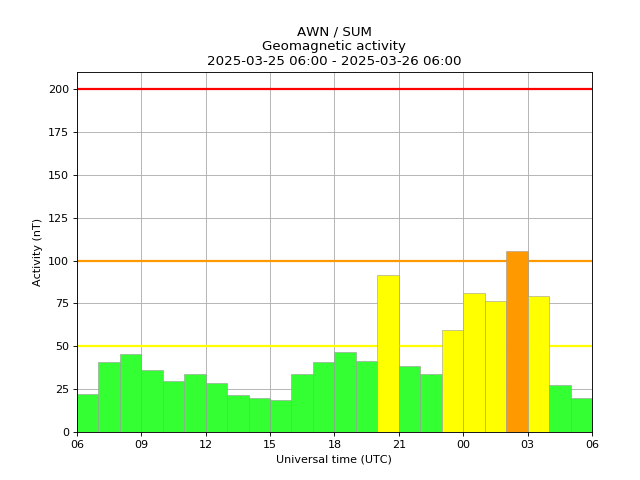 |
|
8-day Lerwick Observatory K Index Showing max K4 on the evening of 2025-03-25 / 2025-03-26 |
 |
|
Planetary K-Index and other information (Space Weather
Prediction Centre) shows Kp5 on the early morning of 2025-03-26 |
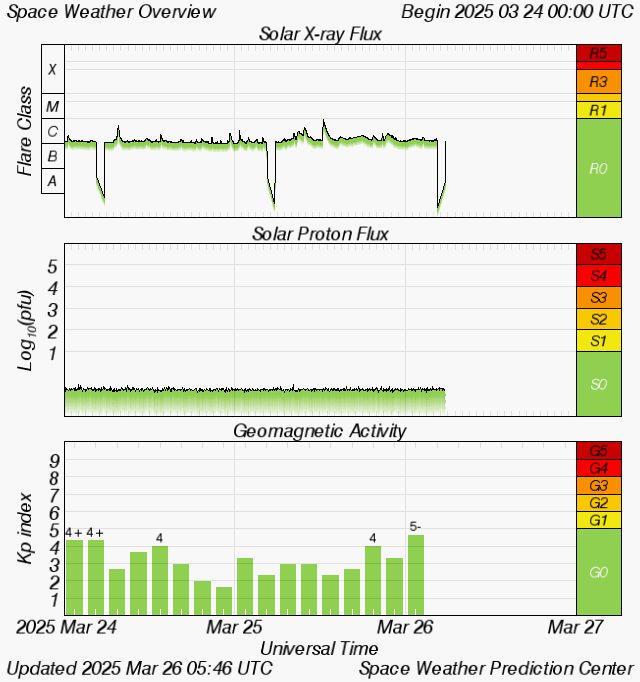 |
Back to Top
|
Aurora Forecast for 2025-03-26 00:58 UT (GMT) (From Space Weather Prediction Centre, http://www.swpc.noaa.gov ) |
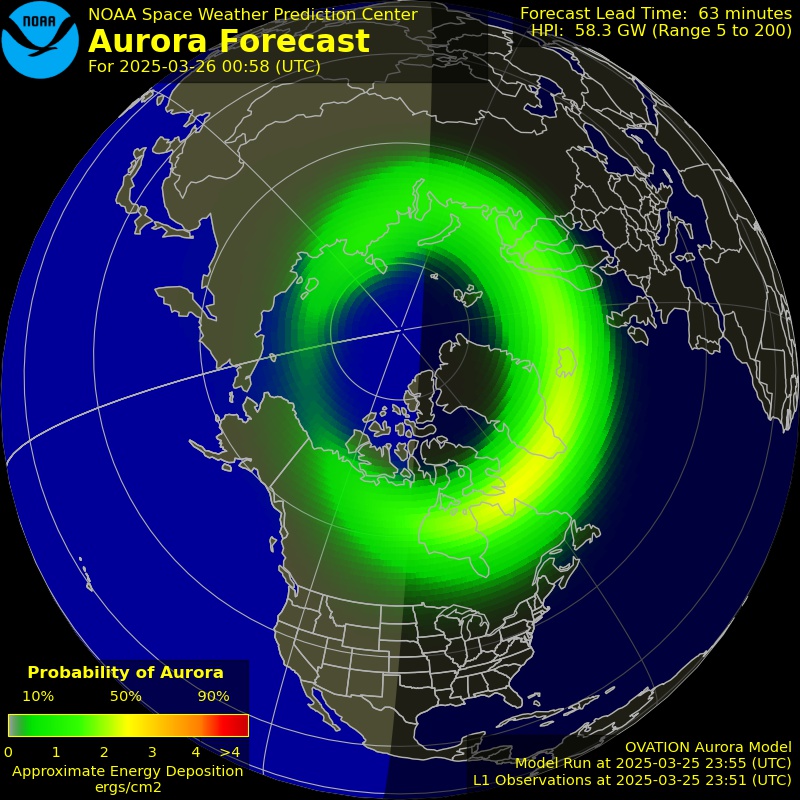 |
Back to Top
| This Web Page: | Aurora - 2025-03-25 / 2025-03-26 |
| Last Updated : | 2025-04-02 |
| Site Owner : | David Richards |
| Home Page : | David's Astronomy Web Site |